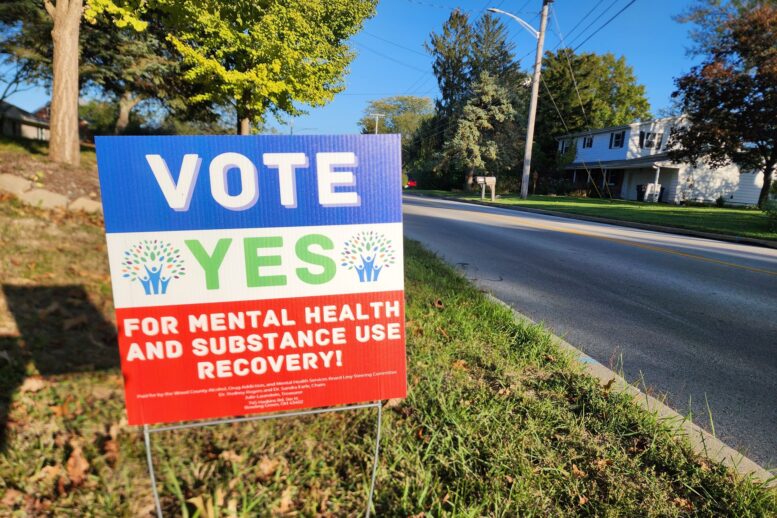By JULIE CARLE
BG Independent News
Wood County Alcohol, Drug Addiction, and Mental Health Services has built a system of care that Wood County residents rely on. The agency is asking voters to approve a 1.6 mill renewal levy on the November ballot to ensure that system of care continues.
While state and federal funds and grants help support local drug and alcohol treatment, mental health outpatient treatment and criminal justice programs, those monies can only be used for a specific population or program, said Amanda Kern, WCADAMHS executive director.
“Levy dollars are important because they don’t have those restrictions. They really build our system of care, for example programs with NAMI, The Cocoon, our crisis services, prevention efforts and housing,” she said.
“We have one of the best fully functional crisis systems in the region and across the state of Ohio,” Kern said. “We have somebody who will come to see you where you are when you need us, somebody on the phone is always available, and there’s a place people can go now for adults and kids in crisis.”
Crisis services are high-cost programs. “They are what we want to have if anyone is ever in need in Wood County,” she said. “We want somebody who can answer the phone or show up at their door and help them.”
Without local funds, crisis services and prevention programs could be impacted the most.
The levy makes up 62% of its annual levy dollars collected and 44% of the agency’s annual budget. According to the ballot language, the 1.6-mill renewal levy is estimated to collect over $5.3 million annually for 10 years beginning in 2025. The cost to property owners is approximately $33 per $100,000.
The levy dollars help support the work of agencies in Wood County that are providing the services, Kern explained. The community partners include Wood County Addiction Response Collaborative (ARC), Children’s Resource Center (CRC), The Cocoon, Wood County Educational Services Center (WCESC), Harbor, The National Alliance on Mental Illness in Wood County (NAMI-WC), OhioGuidestone, Unison Health and Zepf Center.
Ballot Language:
Proposed Tax Levy (Renewal) Wood County Alcohol, Drug Addiction and Mental Health Services Board
A majority affirmative vote is necessary for passage.A renewal of a tax for the benefit of Wood County for the purpose of providing mental health and addiction services that the county auditor estimates will collect $5,358,000 annually, at a rate not exceeding 1.6 mills for each $1 of taxable value, which amounts to $33 for each $100,000 of the county auditor’s appraised value, for 10 years, commencing in 2025, first due in calendar year 2026.
Among the most critical needs in the county are prevention programs for youth and additional youth-based services.
“Today, what we are funding are the critical services. We have developed them, we been focusing on them, and the future will be in the youth-based services,” she said. “We know the environment with kids is changing. We’ve always worked with kids, but the need is growing. The issues we are seeing, the violence, the bullying. We are pushing our focus and efforts on expanding youth treatment and prevention.”
As more and more youth are struggling with the idea of wanting to hurt themselves or others, reaching kids before they get to that point is part of the prevention programming. Programs through partners such as Wood County Educational Services Center, Children’s Resource Center and NAMI will be included in the outreach to school districts. Kern said, “We will be asking, ‘What can we do, what do you need, what are you seeing and how can we support you?’”
WCADAMHS and its partners are working together in a grassroots movement “to build a playbook, designing what it would look like if community mental health was a direct partner with the schools,” she said. “We are trying to take the burden off the teachers.”
They are also focused on providing support to parents because “the parenting game is no longer the same game
Commitment to being good stewards
The county agency is proud of its commitment to being good stewards of the funds they receive.
“We spend so much time, effort and energy to monitor every dollar that flows out of here,” she said. They have increased auditing and outcome monitoring efforts, reviewed every financial report, and ensured they spend the money exactly as defined in the Ohio Revised Code.
The staff deliberately works to keep the administrative rate low. At the current rate of 7% to cover operations and administrative costs, approximately 93 cents of every tax dollar goes directly to Wood County services to aid in real-life difficulties from depression, anxiety and suicide to childhood behavioral problems and domestic violence and more.
“I want the public to know we will take good care of this money and make sure it goes to the people who truly need it,” Kern said.
The community has been very supportive of mental health and addiction services over the years, including approval of levies, but also for events and recognition.
“We appreciate this community so much on behalf of so many people who don’t have the voice or the opportunity to be recognized or those who are stigmatized,” she said. “When we had the fire (in June), so many people reached out with donations and offers of help. Wood County is truly a wonderful place to live and work.”
The levy is important to all Wood County residents, she said. It’s important to people who have friends, family or neighbors with mental health symptoms or who have ever been in a mental health crisis. “They know how hopeless that moment can feel and how powerless you can feel,” she said. The reality is the county agencies are here with knowledgeable experts to provide the necessary support and programs.
Community members who don’t have much first-hand knowledge or experience with the mental health system should be aware that a significant portion of levy funds support prevention programs. “Our goal is if we can build strong and resilient children, then even if they experience mental health symptoms, they will already have the skills, support and resources built around them to be successful adults,” she said.





